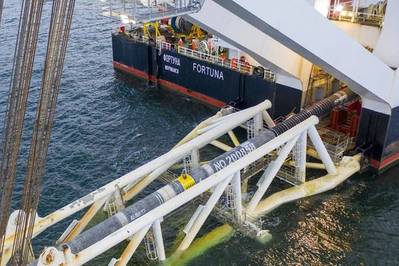Europe Missing Out on Gas with Nord Stream 2 Delay, Russia says
Europe, struggling with soaring gas prices, is missing out on additional Russian supplies amid delays to the Nord Stream 2 pipeline, a top Russian official signaled on Friday.
Deputy Prime Minister Alexander Novak said European companies that invested in the project, which is awaiting German and EU regulatory approval, would be able to ask for additional gas on top of their long-term contracts via the route.
"To my mind, European consumers are very interested in the project to start working, while the companies, which participate in it, they could have submitted additional requests as part of long-term relations on gas supplies via this new gas pipeline," Novak told Russian state TV channel Rossiya-24.
Nord Stream 2, completed in September, has faced resistance from the United States and several European countries including Poland and Ukraine, which say it will increase Russia's leverage over the continent.
The project has also become a focal point in a broader standoff between the West and Russia amid tensions over Ukraine.
Novak said he expected Nord Stream 2 to obtain clearance in the middle of 2022.
Western partners of Russian gas giant Gazprom in the project are Germany's Uniper and BASF's Wintershall Dea, international oil major Shell, Austria's OMV, and France's Engie.
Several European politicians and experts have accused Russia of holding back gas supplies to Europe in an attempt to speed up the certification of Nord Stream 2.
Russia has denied this, while some key buyers of its gas have said they haven't asked for additional supplies.
Novak also said mistakes by European politicians in conducting energy policy, including moves to cut long-term gas supply deals in favor of spot market, had been some of the key reasons behind the surge in gas prices.
The Yamal-Europe pipeline that usually sends Russian gas to western Europe was operating in a reverse mode for a fourth day on Friday, data from German network operator Gascade showed, shipping fuel from Germany to Poland.
(Reporting by Anton Kolodyazhnyy, Olesya Astakhova, and Vladimir Soldatkin Editing by Kirsten Donovan and Mark Potter)

















